May 28, 2007
23 Down
For example, wrack by fear in issue (7)
It's not at all clear from the CoMPLEX course materials just what the purpose of the Plymouth trip is intended to be, but having been through it here's my post hoc rationalisation: it's to acquaint us poncy, high-falutin' abstractioneers with the grubby business of biology on the ground. In which endeavour it succeeds pretty well.
For all the philosophical assertions that inductive reasoning is meaningless, in reality it is very difficult to determine anything much about the way the world works -- especially the biological world, which is pathologically complicated and interconnected and contingent -- without actually looking at it; at great length and in painstaking detail. A correct understanding of nature may not proceed automatically from observation -- things are frequently not at all what they seem -- but is very unlikely to arrive in the absence of it.
Which leads us to the practice of marine biology, which on the face of it is rather firmly stuck somewhere in the 19th century.
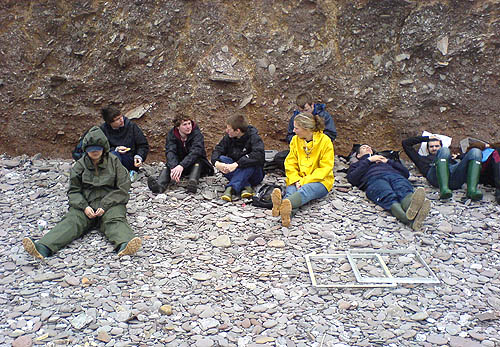 The vast majority of marine biology falls into that class of science that Rutherford dismissed as stamp collecting. As illustrated by two days of often painfully dry lectures about algae and plankton, this tends to be desperately tedious both in its process and its results. While tossing quadrats onto the intertidal reef and counting species coverage inside might be amusing for a few hours, the years of drudgery involved in gathering meaningful data sets are a whole other story. Yet, without such data, marine ecologies -- involving as they do hundreds or even thousands of species with enormously complex relationships to each other and to their constantly varying environments -- would be fundamentally impenetrable.
Which leads us to day three, and just such quadrat-tossing.
The vast majority of marine biology falls into that class of science that Rutherford dismissed as stamp collecting. As illustrated by two days of often painfully dry lectures about algae and plankton, this tends to be desperately tedious both in its process and its results. While tossing quadrats onto the intertidal reef and counting species coverage inside might be amusing for a few hours, the years of drudgery involved in gathering meaningful data sets are a whole other story. Yet, without such data, marine ecologies -- involving as they do hundreds or even thousands of species with enormously complex relationships to each other and to their constantly varying environments -- would be fundamentally impenetrable.
Which leads us to day three, and just such quadrat-tossing.
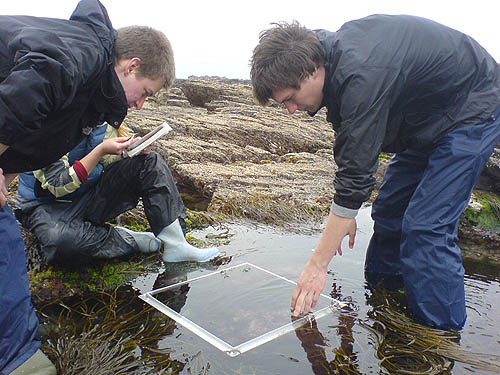 By all rights, this should have been the highlight of the tour, and it certainly was pretty good fun. Despite grey, cold and half-heartedly spitting conditions, it was both entertaining and somehow redemptive to trudge out into the sea, roll up one's sleeves and get wet and slimy in the intertidal zone. Odd little finds -- an egg-laden crab or brightly-patterned whelk -- became foci of excitement and heated competition. But even so, emerging from the day with just nine haphazard data sets lent an air of futility to it all. How could such disparate and error-prone data possibly tell us anything even vaguely useful?
Which in turn leads us to day four, which was the real highlight -- and all the more so for being entirely unexpected. Timetabled as Multivariate Analysis, this was actually an extended session on the difficulties of, and approaches to, deriving meaningful information from the kinds of stamp-collecting data produced by field biology -- and, really, the life sciences in general. The difficulties are many, and often -- though certainly not always -- obvious. That mathematics, and in particular statistics, can come up with ways of dealing with those problems is both fascinating and inspirational.
While some of the techniques discussed were familiar from my previous life at APT -- a company whose whole basis is multivariate analysis of financial time series data -- others, notably multidimensional scaling or MDS, were novel. The day's lecturer, a retired biostatistician with longstanding connection to the MBA in Plymouth, combined dusty professorial authority with a thoroughly engaging style, always connecting the abstruse statistical subjects to matters of practical biological concern; and his nifty software, Primer, managed to produce meaningful results even from our own half-baked data from the day before.
At the end of the day, we were encouraged to attend a presentation by an eminent visitor from Imperial College who, for reasons of his complete fucking idiocy, will remain nameless. I cannot bring myself to describe his incredibly arrogant, delusional, misbegotten nonsense in any detail; suffice to say that it boiled down to little more than "all (marine, but let's not limit ourselves) biological modelling of the 20th century was misguided bollocks, and only I have seen the One True Way; cast off your shackles and join me, and I shall free you from the petty requirements of, you know, people who actually know about that stuff." I fear he lost me within the first five minutes of the talk, and by the end I was bursting with devastating questions. But I was also bursting for a pee, and couldn't bear the thought of listening to the bullshit answers he might come up with, so I kept my trap shut; for which at least one of my fellow students (all of whom were united in their disdain for this berk) chided me later. L'esprit d'escalier tells me I should have challenged him, but really, life's too short.
Instead, we made our escape and enjoyed the last of the sunshine along the seafront.
By all rights, this should have been the highlight of the tour, and it certainly was pretty good fun. Despite grey, cold and half-heartedly spitting conditions, it was both entertaining and somehow redemptive to trudge out into the sea, roll up one's sleeves and get wet and slimy in the intertidal zone. Odd little finds -- an egg-laden crab or brightly-patterned whelk -- became foci of excitement and heated competition. But even so, emerging from the day with just nine haphazard data sets lent an air of futility to it all. How could such disparate and error-prone data possibly tell us anything even vaguely useful?
Which in turn leads us to day four, which was the real highlight -- and all the more so for being entirely unexpected. Timetabled as Multivariate Analysis, this was actually an extended session on the difficulties of, and approaches to, deriving meaningful information from the kinds of stamp-collecting data produced by field biology -- and, really, the life sciences in general. The difficulties are many, and often -- though certainly not always -- obvious. That mathematics, and in particular statistics, can come up with ways of dealing with those problems is both fascinating and inspirational.
While some of the techniques discussed were familiar from my previous life at APT -- a company whose whole basis is multivariate analysis of financial time series data -- others, notably multidimensional scaling or MDS, were novel. The day's lecturer, a retired biostatistician with longstanding connection to the MBA in Plymouth, combined dusty professorial authority with a thoroughly engaging style, always connecting the abstruse statistical subjects to matters of practical biological concern; and his nifty software, Primer, managed to produce meaningful results even from our own half-baked data from the day before.
At the end of the day, we were encouraged to attend a presentation by an eminent visitor from Imperial College who, for reasons of his complete fucking idiocy, will remain nameless. I cannot bring myself to describe his incredibly arrogant, delusional, misbegotten nonsense in any detail; suffice to say that it boiled down to little more than "all (marine, but let's not limit ourselves) biological modelling of the 20th century was misguided bollocks, and only I have seen the One True Way; cast off your shackles and join me, and I shall free you from the petty requirements of, you know, people who actually know about that stuff." I fear he lost me within the first five minutes of the talk, and by the end I was bursting with devastating questions. But I was also bursting for a pee, and couldn't bear the thought of listening to the bullshit answers he might come up with, so I kept my trap shut; for which at least one of my fellow students (all of whom were united in their disdain for this berk) chided me later. L'esprit d'escalier tells me I should have challenged him, but really, life's too short.
Instead, we made our escape and enjoyed the last of the sunshine along the seafront.
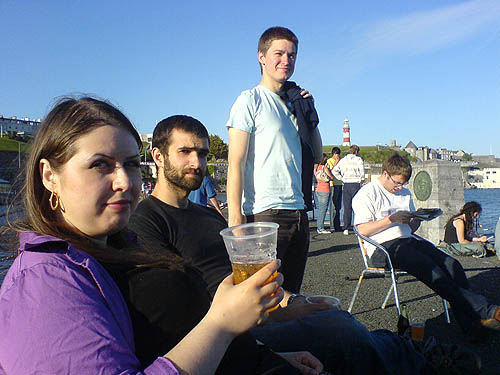 The final day -- also my 40th birthday, disarmingly celebrated by my fellow students -- was mostly focussed on sessile fauna, which is to say animals that root themselves to the spot and let the sea bring them everything they need, a popular marine lifestyle that doesn't translate to dry land.
The final day -- also my 40th birthday, disarmingly celebrated by my fellow students -- was mostly focussed on sessile fauna, which is to say animals that root themselves to the spot and let the sea bring them everything they need, a popular marine lifestyle that doesn't translate to dry land.
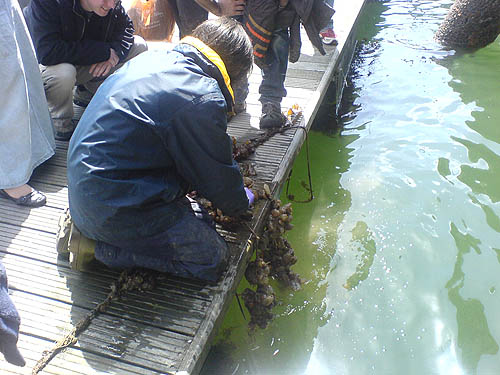 There's a huge variety of such creatures, most of them best seen through the microscope -- in which circumstance they are pretty fascinating. Moored crustaceans like barnacles fall into this category, as do corals and other cnidaria, sponges, superficially plant-like colonial organisms like bryozoa and hydroids, and the chordate (and thus most closely related to us) ascidians. After a morning examing and identifying these creatures, we went off to one of Plymouth's several marinas to look at them more or less in situ, on tethered plates placed for exactly that purpose.
There's a huge variety of such creatures, most of them best seen through the microscope -- in which circumstance they are pretty fascinating. Moored crustaceans like barnacles fall into this category, as do corals and other cnidaria, sponges, superficially plant-like colonial organisms like bryozoa and hydroids, and the chordate (and thus most closely related to us) ascidians. After a morning examing and identifying these creatures, we went off to one of Plymouth's several marinas to look at them more or less in situ, on tethered plates placed for exactly that purpose.
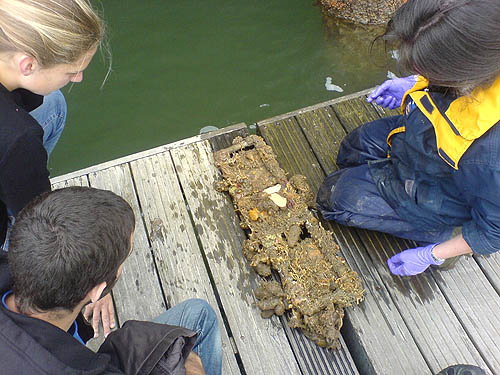 The sun even came out for the occasion, one of the rare glimpses over the week, making for a really rather charming outing.
A fair proportion of the journey home was occupied by the Guardian cryptic crossword, set in this case by remarkably geeky and on this evidence also fundamentally rubbish Taupi, whose clues provoked some serious vituperation en route. It took three people more than two hours to polish off the motherfucker, and the very last clue to fall was that reproduced at the top of this post. Partway through the interminable process it was noted that, at the end a week focussing on microscopic marine life, every bloody clue seemed to be hinting at some kind of aquatic entity. Which made the eventual answer to this infuriatingly intractable riddle all the more annoying when it finally came clear.
Intersecting letters -- albeit most not found until pretty near the end -- were S_A_E_D. Go on. Take a wild guess.
The sun even came out for the occasion, one of the rare glimpses over the week, making for a really rather charming outing.
A fair proportion of the journey home was occupied by the Guardian cryptic crossword, set in this case by remarkably geeky and on this evidence also fundamentally rubbish Taupi, whose clues provoked some serious vituperation en route. It took three people more than two hours to polish off the motherfucker, and the very last clue to fall was that reproduced at the top of this post. Partway through the interminable process it was noted that, at the end a week focussing on microscopic marine life, every bloody clue seemed to be hinting at some kind of aquatic entity. Which made the eventual answer to this infuriatingly intractable riddle all the more annoying when it finally came clear.
Intersecting letters -- albeit most not found until pretty near the end -- were S_A_E_D. Go on. Take a wild guess.
Posted by matt at May 28, 2007 06:42 PM
Comments
Awe within seed, although I guess initially reading wrack as in Fucus rather than the more logical meaning helps. But the letters are useful prompts.
And you need a bigger bladder; it's always fun watching people discover the audience isn't as thick as they assumed (perhaps you should simply have started the collaborative crossword during the lecture).
Posted by: Anyhoo at June 2, 2007 11:14 AM
Oh good grief. I simply cannot solve crosswords such as this one. I admit my failings freely--leave me to me random, simple clues.
Posted by: Sin at June 2, 2007 12:07 PM
Something to say? Click here.











